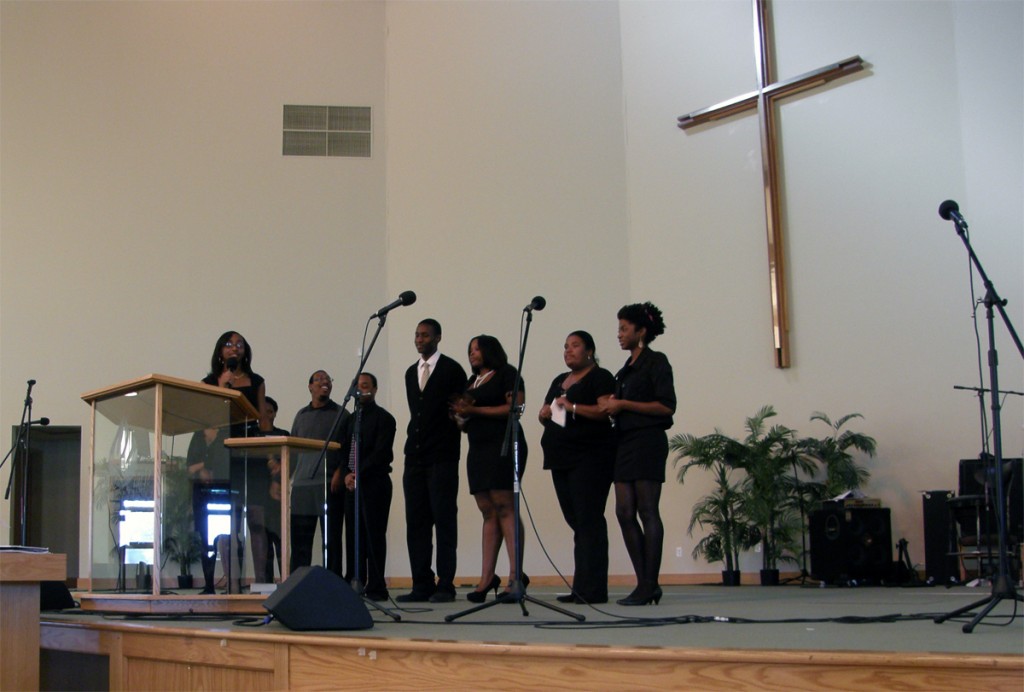

SUNY New Paltz students, faculty and alumni wore black as a symbol of unity and gathered at Pointe Praise Family Life Center in Kingston N.Y. to observe Black Solidarity Day on Monday.
Black Solidarity Day is traditionally observed every year on the Monday before Election Day and is celebrated throughout the nation. On Black Solidarity Day, African Americans and supporters are encouraged to “abstain from participation in the social, political and economic affairs of the nation” as a way to remind the nation of the collective strength and political power of the Black community, said Jaunia Coombs, the public relations representative for the Black Student Union.
“The day is spent assessing collective priorities, political and economic power, voting strategies, and plans for the future,” said Coombs. “In the process, they are able to remind themselves and others of their potential for political and economic power through solidarity.”
This year’s theme was “Education: Promoting Academic Excellence in the Black Community.”
With help from the Black Studies Department, the Black Student Union organized a retreat from campus where attendees were given the opportunity to listen to keynote speaker Dr. Theresa Perry, a professor of Africana Studies and Education at Simons College. Participants could also attend four workshops lead by SUNY New Paltz Professors Dr. A.J. Williams-Meyers, Residence Director and Adjunct Professor Chanel Ward and SUNY New Paltz alumni Dr. Anthony Wynn and Anson Dean.
Williams-Meyers said the purpose of Black Solidarity is “to reflect on the journey and the struggle through U.S. history those who came before us confronted, as well as that same struggle and journey of which we in the 21st century have assumed, and now prepare the way for those who will come after us.”
Shaina Buchanan, a fourth-year media management student, has attended Black Solidarity Day since her first year at SUNY New Paltz when she was encouraged to by her mentor from the Scholar’s Mentorship Program.
“As a freshman, it was all new to me. I had no idea what Black Solidarity Day was,” Buchanan said. “Every Black Solidarity Day has always been different and always had a different outcome. It’s all positive.”
After breakfast, all attendees gathered around in a big circle and then moved around the room and greeted everybody with a hug.
Buchanan called the greeting karibu, an African term for “welcome.”
“You begin the day by getting close to people you don’t even know…,” said Buchanan. “But you begin that by just breaking that seal, by breaking that awkward tension … we all go to greet each other and start the day in a really positive light.”
Student Sen. Marc Pottak, who attended the event for the first time described it as an “eye-opening experience.”
“Being Caucasian myself, I can only hope to learn about the history involved and the daily lives of African Americans in our community and worldwide,” he said. “It is a means for me to further learn and understand the African worldview and widen my perspectives on life.”
Aside from being a day where students, faculty and alumni can come together and talk about issues that affect the Black community, Coombs said the most unique part of Black Solidarity Day is the wide variety of people who attend the events.
“It is a day in which Black, White, Asian and Latino students, faculty and alumni can all participate,” said Coombs. “The sense of unity that is felt amongst people who most times have never spoken to one another in the past, is the most wonderful part of the day.”

this is a very good artical and holiday because it shows what the african american community is worth